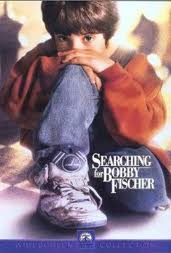
SEARCHING FOR BOBBY FISCHER
US, 1993, 110 minutes, Colour.
Max Pomeranc, Joe Mantegna, Ben Kingsley, Joan Allen, Laurence Fishburne, Robert Stephens, David Paymer, William H.Macy.
Directed by Steven Zaillian.
Searching for Bobby Fischer is an impressive directorial debut for writer-director Steven Zaillian, whose writing includes Jack the Bear, The Falcon and the Snowman, Awakenings and Schindler's List.
The film was based on the autobiography of New York journalist Fred Waitzkin, focusing on his prodigy son, Josh, a master chess player at the age of seven. The title of the film focuses on child chess prodigy Bobby Fischer and includes a great deal of newsreel footage, highlighting the eccentricity of his childhood, early adulthood, championship style, disappearance.
The story of Josh Waitzkin, child prodigy, was to be the opposite - cared for by his parents and by his friends and coaches so that he would have a full life while enjoying chess.
The film is persuasive on the human level, showing the bonds in family, the pressures of competition and their destructive powers. Jo Mantegna gives a sympathetic performance as
Fred Waitzkin, Joan Allen as his wife. Ben Kingsley plays the real-life Bruce Pandolfini (who was technical director for the film) who taught the young Josh Waitzkin. Also in the cast are Laurence Fishburne as a chess-playing drug addict of Washington Square Park, Robert Stephens as an English tutor, David Paymer and William H. Macy as chess parents. Max Pomeranc is excellent and credible as the seven-year-old Josh.
The film is a delight for those familiar with the game of chess. However, it is a moving human document and highlights the exhilaration of achievement and gift as well as the destructiveness of obsession and pressure.
1. The world of chess, professional, amateur? Audience knowledge of chess or not, delight in the game? The status of Bobby Fischer as child prodigy, chess player, artist, American hero? The American obsession for his successor?
2. The title and its focus, the introduction of the footage of Bobby Fischer: the fact of his life and achievement, his mystique, American, playing the games, his arrogance, his personal life - and his disappearances? The end and his reappearance in 1992 and his achievement?
3. The New York settings, Washington Square and the park, the dark chess clubs, the hotels and the tournaments, the musical score and its atmosphere?
4. Games and sports, the artistry, the gift, the effect on the gifted individual, on others - loving and hating, on parents and their pressures of achievement, on teachers and their commitment to their students?
5. The film as a true story - and its aftermath?
6. Josh at seven, his natural curiosity, the encounter with Vinnie with the chess piece and the board, watching Vinnie and the players in the park, learning from them, the quick game and the shrewd moves? Seeing chess from the inside, as an art? His love for baseball? Bond with his father, his father as commentator, going to the box, friendly with the journalists? His relationship with his mother, her sense of something special in him? Taking him to the park? His sister? The background of family life, priorities? The decor of his room? The stories from his father, the loving care within the family?
7. His mother and her discussing the gift with her husband, Fred playing with him, Josh not wanting to beat his father? Fred going to see Bruce Pandolfino? Going to the club, Bruce showing him the various types, their obsessions, their decisions? Bruce's visit, the discussions, playing Cluedo with Josh? Relating with him? Further classes, sweeping the pieces from the board so that Josh would understand with his mind? The temptation of the certificate for the master chess player? The approach of intelligence? Understanding the game?
8. The contrast with Vinnie, the quick games, playing the opponent and not the board?
9. The tournaments and their atmosphere, the young children, the pressure of the parents, the strong speech against the parents, their being taken out and locked up? Morgan and his father and the friendship with Josh and Fred? The effect of the tournaments, Josh and his winning trophies?
10. The school inspection, the discussions with the teacher, her not understanding what was going on with Josh, Fred and his severe speaking with her?
11. The Englishman and the rival boy, his coaching him, bringing him to the club, the intimidation of Josh? Bruce and his continued classes, the threat of the other boy, his philosophy of winning, the opponents hating you, the drama with the certificates and their meaninglessness - and Bonnie ousting him from the house?
12. Josh and his need for affection, wanting to please his father, losing the game very quickly? The discussions with his father about winning and losing?
13. The changing of his room and its decor, discussions with his father, going back to the park, playing with Vinnie, his father taking him fishing?
14. The portrait of the chess parents, the angry parent and his anxiety, Morgan's father and his calmness, the pressures on the children? Morgan and his friendship with Josh?
15. The build-up to the final, the decision to go, Vinnie going with them? Fred asking Bruce to come and his not being able? His change of heart, presenting Josh with the certificate? The support? Josh free of pressure, able to say he was afraid? The games, the confrontation with the Englishman's protégé? Observing on the television, Vinnie's comments, Bruce's comments - and the tension for the audience? Josh and his remembering Bruce's advice, throwing the big pieces away, understanding the board, knowing the moves? His offering the possibility of a draw? His winning?
16. The Englishman and his protégé not winning, his severity with him?
17. The happy ending - Josh and Morgan walking off together? A film for chess fans, for people who appreciate the struggle of the human spirit? The aftermath information about Josh and his family, of Bobby Fischer?